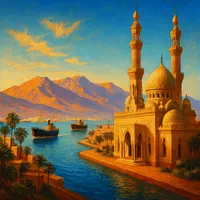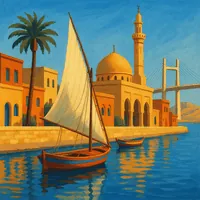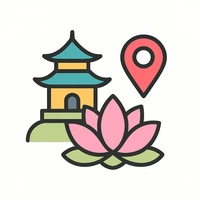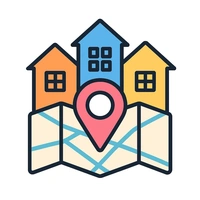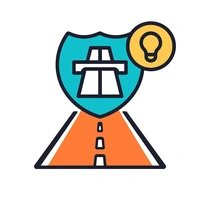Suez, a city that stands as the vital maritime doorway of Egypt, is uniquely characterized by its role as the southern gateway to the Suez Canal. This engineering marvel, completed in 1869, changed global trade routes by connecting the Mediterranean and Red Seas. Unlike any other city, Suez's daily life pulses with the rhythm of international commerce. Standing at Port Tawfiq, one can witness a parade of ships from across the globe, each bearing stories of far-off lands, as they navigate this narrow yet pivotal artery of global trade.

Destinations

Travel Tips & Planning

General City Overview
Notable points about Suez
- Strategic Location: Suez is uniquely situated at the southern entrance of the Suez Canal, one of the world's most important maritime routes, connecting the Mediterranean Sea to the Red Sea. This strategic position makes it a vital hub for global shipping and trade.
- Historical Significance: The city has a rich history, having served as a focal point for trade and military routes. Suez has witnessed numerous historical events and was a significant battleground during the Suez Crisis of 1956.
- Economic Hub: Unlike many other cities in Egypt, Suez's economy heavily revolves around the shipping industry, with the Suez Canal Authority being one of the largest employers. The canal's expansion has further bolstered its economic influence worldwide.
- Diverse Wildlife: The Suez Canal area features unique biodiversity, providing a distinct ecosystem that includes mangroves, salt marshes, and various migratory bird species, attracting wildlife enthusiasts and researchers alike.
- Adventure and Recreation: For thrill-seekers and singles, the nearby Ein El Sokhna offers a range of activities like scuba diving, snorkeling, and windsurfing along the pristine Red Sea beaches, making it an excellent spot for weekend getaways.
- Cultural Fusion: The city presents a compelling blend of modern and traditional Egyptian culture, reflecting its role as a crossroads for different civilizations over centuries, which can captivate history buffs and culture enthusiasts.
- Family-Friendly Atmosphere: Suez offers several parks and recreational areas, such as the Governorate’s central gardens, providing a safe and engaging environment for families with children to enjoy leisure time and outdoor activities.
- Historic Landmarks: Suez is home to notable historic sites such as the Ahmed Hamdi Tunnel, which connects it to the Sinai Peninsula, and is a testament to modern engineering with significant historical relevance.
- Cost of Living: Compared to other major Egyptian cities like Cairo or Alexandria, Suez often offers a more affordable cost of living, making it an attractive option for retirees or those seeking a more laid-back lifestyle.
- Growing Tourism Industry: With increasing investments in tourism infrastructure, Suez is uniquely positioned to capitalize on its maritime legacy and natural attractions, making it distinct from other Egyptian cities like Luxor, which focus primarily on ancient historical tourism.
Summarized User Reviews
Watching ships glide into the Suez Canal at sunrise was strangely calming. There’s something majestic about it.
The city feels worn, like it's worked hard for decades—but the seafood by the docks made it worth the stop.
We met locals at a tea shop who told us canal stories passed down generations. It felt like history was alive.
Lots of concrete, few green spaces. If you’re not into maritime vibes or industrial cities, it’s a short visit.
You haven't really understood Egypt's grit until you've stood at the edge of Suez and felt the hum of commerce.
Interactive Word Cloud for Suez


